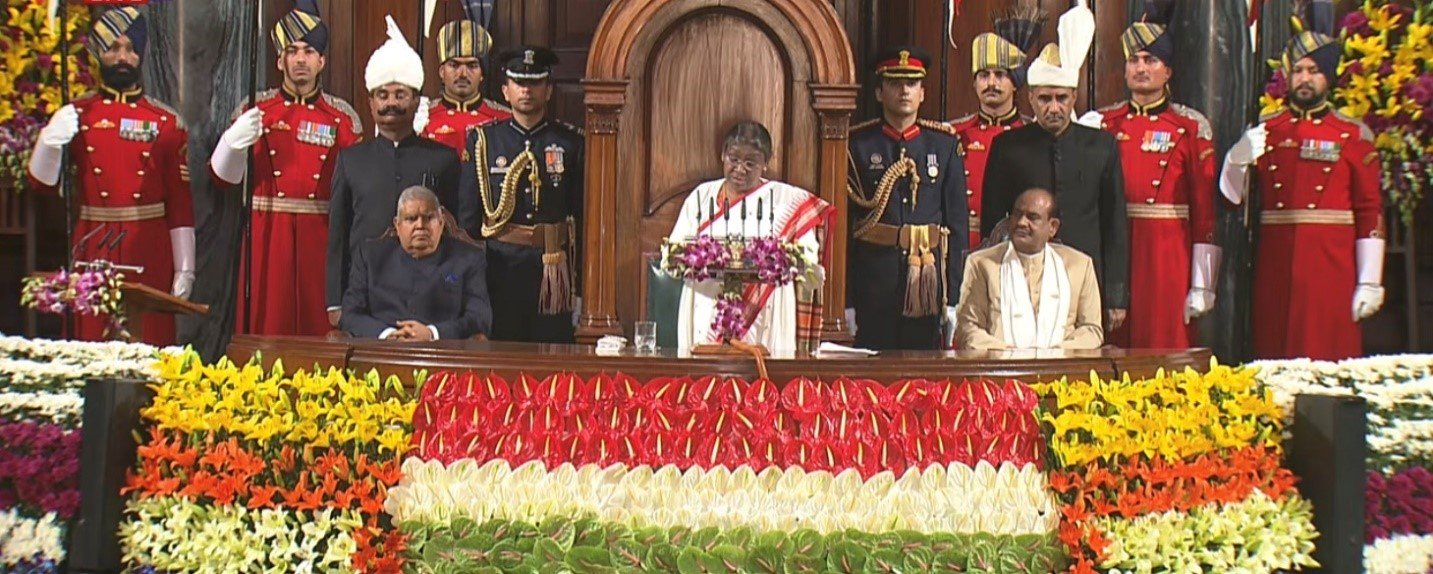(Combining related stories)
Droupadi Murmu, the President of India on Tuesday delivered her maiden address to the joint sitting of Parliament on the first day of the Budget session where she highlighted the achievements that the country has made under Prime Minister Narendra Modi.
Later, opposition parties criticised the President’s address alleging that the speech was like the “first chapter” of the ruling BJP’s manifesto for 2024 and key issues related to price control, communal harmony and women were “missing”.
In her over hour-long speech, Murmu said, “India now has a government which is stable, fearless and decisive and which works to fulfil big dreams. It has a government which respects honesty and works to solve the poor’s problems and empower them permanently.”
The government has fulfilled the aspirations of the deprived sections of society, the president said.
She said ‘Amrit Kaal’, described by the government as the 25-year period culminating in the centenary of India’s independence, is the time to build an India which is ‘aatmanirbhar’ (self-reliant) and also fulfils its humanitarian obligations.
It will be an India with no poverty and a prosperous middle class and whose youth and women are at the vanguard of guiding the nation, the president said, amid frequent thumping of desks by lawmakers at the Central Hall of Parliament.
“My government is of the firm opinion that corruption is the biggest enemy of democracy and social justice. Therefore, there has been a relentless fight against corruption in the last few years. We have ensured that the honest will be honoured in the system. There is increasing social consciousness in the country that there should be no sympathy for the corrupt in the society,” she said.
The India of 2047, she said, should have no poverty with the middle class also being prosperous.
Murmu touched upon India’s ongoing presidency of the G20, chairship of the Shanghai Cooperation Organisation (SCO) as well as its role in the Quad with a focus on working for peace, stability and prosperity in the Indo-Pacific.
However, there was no reference to India’s frosty ties with Pakistan and China, though she mentioned the challenge of terrorism in Jammu and Kashmir.
Amid India’s lingering border row with China in eastern Ladakh as well as the challenges of Pakistan-backed cross-border terrorism in Jammu and Kashmir.
Without directly mentioning either Pakistan or China, the President, who is also the supreme commander of the armed forces, highlighted that “befitting response” was given to every “misadventure from LoC (Line of Control) to LAC (Line of Actual Control)”.
The world is looking towards India with “high hopes” and it is among those countries that are reinforcing the trust in the global supply, Murmu said asserting that the country’s identity as a nation was immortal in the past, and will remain so in the future as well.
The president also highlighted several challenges facing the world and how New Delhi is playing an important role in connecting a “divided world”.
“Today’s world is witnessing many challenges. The relevance and efficacy of international institutions created decades ago is also being questioned,” she said.
“Under these circumstances, India has emerged as a country that is connecting today’s divided world in some form or the other.
Murmu also stated that India has achieved the target of making 40 per cent of its electricity generation capacity from non-fossil fuel sources, a success that has strengthened the resolve to achieve Net Zero by 2070.
“India has also changed the perception, which considers progress and nature as contradictory,” she said addressing lawmakers in the Central Hall of Parliament.
She said the government has increased the solar power capacity by almost 20 times in the last eight years and India now ranks fourth in the world in renewable energy capacity.
“My government is focusing on green growth and is emphasizing on connecting the entire world with Mission LiFE,” Murmu said.
Prime Minister Narendra Modi had announced Mission LiFE at the climate conference in Glasgow in 2021 urging nations to replace the prevalent ‘use and dispose’ economy with a circular economy defined by mindful and deliberate utilisation.
Murmu said her government has constantly laid unprecedented emphasis on innovation and entrepreneurship.
“This is harnessing the strength of our country with the world’s youngest population. Today our youth are demonstrating the power of their innovation to the world,” she said.
Following her address, Congress president Mallikarjun Kharge said it is the “government’s statement that has come through the President” and there is nothing new in it.
“If the government is claiming that the country has progressed so much, then why do the poor people of the country continue to suffer due to unemployment and high inflation,” he said and alleged that the schemes “renamed” by the Modi government are not reaching the poorest of the poor.
TMC Rajya Sabha MP Derek O’Brien said that while it is “convention” that the President’s address is “written” by the government of India, key issues were absent in her speech.
“As is convention, President’s Address to both Houses of #Parliament is written by GoI. Any line in speech about controlling prices, creating jobs, strengthening (fiscal) federalism, promoting communal harmony, passing Women s Reservation Bill? Oh and 2 miserly lines about the North East,” said Brien.
CPI MP Binoy Viswam alleged the empowerment of women, youths, Dalits and tribals was only on paper.
“The historic Central Hall witnessed the President’s address, maybe for the last time. Everything related to freedom struggle and Constitution are being dumped. The address seems to be the first chapter of the ruling party manifesto for 2024. Words are lovely; truths are not..!” he said on Twitter.
“Pride of secularism is absent. Hindutva pride of RSS mould was the tone. Empowerment of women, youth, Tribes, Dalits only on paper. Environment and Subhash Bose mentioned.. Nicobar is crying…,” the CPI MP said in a tweet.


